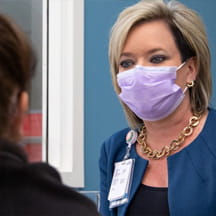The COVID-19 pandemic left an indelible mark on most aspects of the health care landscape, including how management teams lead their departments.
“Coming out of the pandemic, our leaders were a little bit rusty around their leadership skills because they had been in crisis management mode that required a lot of top-down decision making as opposed to lifting their teams,” says Mark Anderson, vice president of human resources at Riley Children’s Health in Indianapolis. “There will always be things we can't control industry wide, but every team member deserves an excellent leader, and every leader deserves the tools to be that kind of leader.”
Breaking down silos
To facilitate its leaders’ professional growth, Riley Children’s established a triad leadership development program. In this approach, a medical, clinical and administrative leader from each of the hospital’s 17 units convened to address strategic initiatives.
The initiative aimed to elevate the leadership skills of the triad members while breaking down management silos that had grown more isolated during the pandemic. The mere composition of the triads was a big first step—for some, it was their first opportunity to work on projects together.
From there, clusters of three or four triads from different corners of the organization were combined and moderated by a C-level executive. Those groupings collaborated on ways to improve the patient experience, employee retention, quality and safety and financial goals. The individual triads and their clusters met regularly, while the entire cohort met monthly around a curriculum developed by the program participants and the steering committee.
While it may have been easier to adopt a professionally curated curriculum for the program, Anderson and his team determined it was important for the learnings to come from within.
“We built the content and are running the course in a way that's meaningful and tangible so the triad members can take learnings back to their units and implement them right away,” says John Harding, the hospital’s chief operating officer. “That was one of our primary goals. We didn’t want this to be just another binder for everybody to put on their shelf. This really had to be actionable.”
Early results show promise
The program’s first cohort started in the spring of 2023 and is nearing completion of its eight-month run, culminating with a group-wide retreat. Riley Children’s is assessing triad leadership model’s impact, but early results indicate improvements in aggregate patient experience scores, harm rates and net operating income compared to the same period last year. Perhaps the most direct example of the program’s significance is a nearly 15% increase in employee retention in the service lines targeted for triad leadership training.
The qualitative results have proven enough for Riley Children’s to plan a second cohort expanding the program across the organization. It’s a lesson that proves communication and coordination can lead to great things, Anderson says.
“We've seen some really good relationships built through this program. It's knocked down some walls, and it's been really gratifying to see that,” Anderson says. “Soft skills can have a hard impact on your results, so if you really focus it in the right areas with the right people and tie the training to your strategic initiatives, this kind of program can really help you achieve your organizational goals.”



